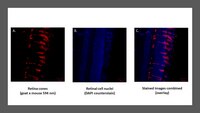MABN2636-25UG Sigma-AldrichAnti-Arrestin-C Antibody, clone 7G6
Anti-Arrestin-C, clone 7G6, Cat. No. MABN2636, is a mouse monoclonal antibody that detects Arrestin-C and is tested for use in Immunofluorescence, Immunohistochemistry, and Western Blotting.
More>> Anti-Arrestin-C, clone 7G6, Cat. No. MABN2636, is a mouse monoclonal antibody that detects Arrestin-C and is tested for use in Immunofluorescence, Immunohistochemistry, and Western Blotting. Less<<Recommended Products
Overview
| Replacement Information |
|---|
| References |
|---|
| Product Information | |
|---|---|
| Format | Purified |
| Presentation | Purified mouse monoclonal antibody IgG1 in buffer containing 0.1 M Tris-Glycine (pH 7.4), 150 mM NaCl with 0.05% sodium azide. |
| Quality Level | MQ200 |
| Physicochemical Information |
|---|
| Dimensions |
|---|
| Materials Information |
|---|
| Toxicological Information |
|---|
| Safety Information according to GHS |
|---|
| Safety Information |
|---|
| Storage and Shipping Information | |
|---|---|
| Storage Conditions | Recommend storage at +2°C to +8°C. For long term storage antibodies can be kept at -20°C. Avoid repeated freeze-thaws. |
| Packaging Information | |
|---|---|
| Material Size | 25 μg |
| Transport Information |
|---|
| Supplemental Information |
|---|
| Specifications |
|---|
| Global Trade Item Number | |
|---|---|
| Catalog Number | GTIN |
| MABN2636-25UG | 04065266908244 |
Documentation
Anti-Arrestin-C Antibody, clone 7G6 SDS
| Title |
|---|
Anti-Arrestin-C Antibody, clone 7G6 Certificates of Analysis
| Title | Lot Number |
|---|---|
| Anti-Arrestin-C, clone 7G6 - 4033776 | 4033776 |
| Anti-Arrestin-C, clone 7G6 - 4140434 | 4140434 |
| Anti-Arrestin-C, clone 7G6 - 4142011 | 4142011 |
| Anti-Arrestin-C, clone 7G6 - Q3745694 | Q3745694 |








